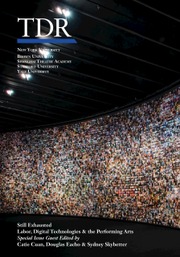No CrossRef data available.
Article contents
Theatre for Future
A New Paradigm for a More Sustainable Existence
Published online by Cambridge University Press: 10 March 2023
Abstract
The human species has the ability to understand complex systems such as planetary boundaries. But then it does not take action and destroys its existential basis, its global habitat. Whether the story ends here is up to us. A new relationship between science, art, and activism suggests a new paradigm to support a more sustainable existence.
- Type
- Names and Forms
- Information
- Copyright
- © The Author(s), 2023. Published by Cambridge University Press for Tisch School of the Arts/NYU
References
Benedikt, Gloria. 2020. Science and Art for Life’s Sake: How partnerships between artists and scientists can support the transformation toward sustainability. Laxenburg, Austria: IIASA.Google Scholar
Clay, Jonathan, dir. 2021. Breaking Boundaries: The Science of Our Planet. London: Silverback Films.Google Scholar
Figueres, Christiana, and Rivett-Carnac, Tom. 2020. The Future We Choose: The Stubborn Optimist’s Guide to the Climate Crisis. New York: Vintage Books.Google Scholar
Ghosh, Amitav. 2016. The Great Derangement: Climate Change and the Unthinkable. Chicago: The University of Chicago Press.CrossRefGoogle Scholar
Guterres, António (@antonioguterres). 2022. “I’ve seen many reports[…]” Twitter, 28 February, 6:18 AM. twitter.com/antonioguterres/status/1498256378506448899?lang=en
Google Scholar
Mithen, Steven. 2005. The Singing Neanderthals: The Origins of Music, Language, Mind, and Body. London: Weidenfeld & Nicolson.Google Scholar
Puchner, Martin. 2017. The Written World: The Power of Stories to Shape People, History, Civilization. New York: Random House.Google Scholar
Puchner, Martin. 2022. Literature for a Changing Planet. Princeton, NJ: Princeton University Press.Google Scholar
Scientists for Future (SfF). 2019. “Initial statement.” https://de.scientists4future.org/ueber-uns/stellungnahme/
Google Scholar
Ulrich, Bernd. 2021. “Warum, zur Hölle? Wir leben in einer ökologischen Krise, aber die Literatur lässt uns damit allein. Dabei brauchen wir sie. Jetzt!” Die Zeit 43 (October). www.zeit.de/2021/43/literatur-klimawandel-corona-klimakrise-kultur-zukunft-science-fiction?page=9
Google Scholar
Zhong, Raymond. 2022. “These Climate Scientists Are Fed Up and Ready to Go on Strike.” New York Times, 1 March. www.nytimes.com/2022/03/01/climate/ipcc-climate-scientists-strike.html
Google Scholar




